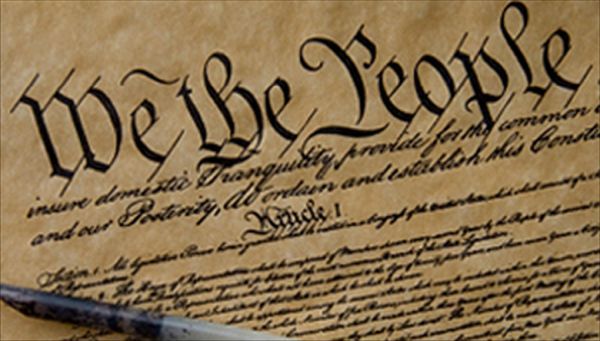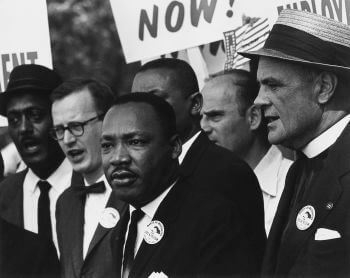There’s almost no end to the claims that boycotting Israel is “free speech,” protected by law. But this actually reflects a misunderstanding of how the US Constitution and similar laws of other Western nations work.
The international Boycott, Divestment and Sanctions (BDS) movement against Israel has capitalized on this misunderstanding to galvanize support, wage a propaganda campaign, oppose laws that would stop those activities, and pursue Israel’s economic isolation.
This is a topic that involves strong emotions, politics and complicated legal technicalities.
To be clear, no private citizen is obligated to buy products from any particular foreign nation: that is a personal choice. Individuals boycotting Israel have every right to select the goods they buy. Similarly, anyone may lobby the US government to institute a boycott at a national level: that is free speech.
However, attempting to implement a private boycott against a foreign nation illegally bypasses Congress’s exclusive power to regulate foreign trade, and thus undermines the American democratic system.
What is BDS?
BDS seeks to cast Israel as an “apartheid state” that should be subject to international boycott. Many people mistakenly believe that boycotting Israel is a social justice movement designed to bring equal rights to Palestinians.
I addressed this claim head-to-head against BDS co-founder Omar Barghouti on live television:
(To see the full 20 minute television segment click HERE)
If one listens carefully to the BDS founders and heavyweight leaders (as in the above television segment) their stated goal is not social justice, but rather the destruction of the world’s only Jewish state. These three quotes reveal their real agenda.
1. Omar Barghouti, founder, BDS:
“Definitely most definitely we oppose a Jewish state in any part of Palestine.” (Separately he clarifies that “Palestine” means all of Israel.)
2. As’ad AbuKhalil, California State University Professor of Political Science, BDS leader and activist:
“The real aim of BDS is to bring down the State of Israel…this should be stated as an unambiguous goal.”
3. John Spritzler, author, BDS leader and activist:
“I think the BDS movement will gain strength from forthrightly explaining why Israel has no right to exist…”
None of this should be surprising, given the stated position of the Palestinian government: that all of Israel is actually occupied Palestine. Palestinian President Mahmoud Abbas clarified this point when he stood in front of a map of Israel in a public address in January, 2018 and said: “This is our country.”
The BDS Cookbook — a recommended informational resource put together by a group of academics and students concerned about BDS misrepresentations — researched and sourced dozens of similar statements from other major BDS personalities.
What is a boycott?
A “boycott” is not merely a personal choice to not purchase a product. If it were, every trip to the corner store would require an act of Congress.
According to Webster’s Dictionary, a boycott is (emphasis added):
to engage in a concerted refusal to have dealings with (a person, a store, an organization, etc.) usually to express disapproval or to force acceptance of certain conditions
Webster’s defines concerted as:
mutually contrived or agreed on: a concerted effort, concerted agreement, performed in unison
In other words, building a base of public support to cut off business dealings with a particular company or country is a boycott. Choosing on a personal level to buy or not buy a particular product, is not.
Free speech?
When it comes to the question of whether BDS related boycotts are free speech, opinions and “talking heads” abound. The “free speech” claim has been made by: the ACLU (American Civil Liberties Union), academics such as Jewish Voice For Peace’s Joseph Levine, columnists such as Nathan Thrall, the New York Times editorial board, and many more. In the wake of New York’s 2016 anti-BDS executive order, some BDS supporters even cried “McCarthyism.”
Indeed, the idea that boycotts are constitutionally protected free speech has been repeated so often that it is sometimes accepted blindly, and without critical thought.
However, most of the commentators on this topic are not legal scholars, and even the ACLU (though it includes lawyers) is actually an advocacy organization with a specific agenda, and not a source of impartial legal analysis.
The conventional wisdom fails to acknowledge the only source of information that really matters: the United States Constitution itself, and the court cases interpreting it.

The First Amendment and Boycotting Israel
We all know that the First Amendment protects free speech. But do private boycotts against foreign nations actually count as free speech at all? Can boycotting Israel be treated as an expression of free speech?
No.
Congress — and only Congress — may regulate foreign commerce. This includes the exclusive power to implement boycotts, even though a boycott may include some elements of speech. It is significant that this rule comes from the very same section of the Constitution that prohibits private militias and private declarations of war. This is because the framers of the Constitution understood boycotts to be essentially a tool of war – by addressing both topics in Article I Section 8 of the US Constitution. Over the years, numerous rulings have confirmed this interpretation.
Indeed, crushing boycotts and painful sanctions have been used (for example) against Japan in World War II, against Cuba as part of the Cold War, and against Iran over its nuclear activities. Tools of war should be used only by a country’s elected government, not by private individuals. To do otherwise undermines democracy itself.
(For a fuller legal analysis of this point, including specific case law citations, see Sorry BDS, Your Boycott Isn’t Free Speech.)

What about the Civil Rights movement?
Boycotts against foreign nations are fundamentally different from the domestic boycotts associated with the US Civil Rights movement of the 1950s and 60s. Most notable among them was the Montgomery bus boycott of 1955, which nearly bankrupted the Montgomery Bus Line and led to the Supreme Court ruling that segregation on public buses was unconstitutional (Browder v. Gayle).
These were domestic boycotts, designed to express displeasure with the activities of a specific company or other private body within a country. Such boycotts were effective tools not only in the Civil Rights movement, but also in the Women’s Suffrage movement, Cesar Chavez and his National Farmworkers Association, and more. In many cases, these boycotts have played a role in helping to achieve meaningful results: including the abolition of Jim Crow laws against African-Americans, the women’s right to vote, and unionization for farm workers.
All were domestic boycotts.
Again we come back to the consistent theme: a private boycott against a foreign nation is not “free speech” under US law any more than forming a private militia to launch a private war. Just as raising an army is a tool of statecraft — a power reserved exclusively to Congress — so too are other international acts, such as boycotting Israel.
We addressed these inaccurate claims in one of our YouTube videos:
Boycotting Israel and other Western countries
Most of the Western world treats boycotts similarly to the United States. For example, courts and legislative bodies in the United Kingdom, France, Spain, Chile, and others have struck down local or private BDS activities or even passed anti-BDS laws, on similar principles.
The Irish senate advanced legislation banning products originating from Israeli settlements in disputed territories, yet Ireland’s attorney general opposes passing the measure into law, warning that it may violate European Union trade rules, which supersede the individual laws of EU member states.
Indeed, even the less onerous measure of applying special labels to settlement goods has been struck down in other EU countries, such as Greece.
While EU foreign policy chief Federica Mogherini, declared that boycotting Israel constitutes “free speech,” this is merely a talking point which does not constitute binding law. By contrast, the EU’s 2016 Report on Competition Policy interprets the EU trade law as including, “the need to fight against unfair collective boycotts.” The chair of the European Parliament’s Delegation for Relations with Israel confirmed that this language was indeed intended to prevent private boycotts against Israel (as well as others) as a matter of EU trade law.
EU law is evolving, but its underlying philosophy appears to be that no party should be allowed to interfere with the trade priorities set by the EU itself.
In conclusion
There was indeed an American boycott against South Africa: enacted by the United States Congress under the Comprehensive Anti-Apartheid Act of 1986. The United States also enacted an embargo against Cuba, waged economic warfare against Japan, imposed sanctions on Iran, and more. The common denominator among them is that they were imposed by the United States federal government. The Constitution does not hold that boycotts are illegal, only that private, concerted boycotts of foreign nations are illegal.
Once we strip away the slogans and propaganda we see the truth: boycotting Israel has never been “free speech,” by any laws. Open debate is essential to democracy, but taking illegal, private actions against foreign nations undermines our entire system of government.
Cover image: Vecteezy.com and Requestreduce.org with modifications; Rev. King via Wikimedia Commons;


